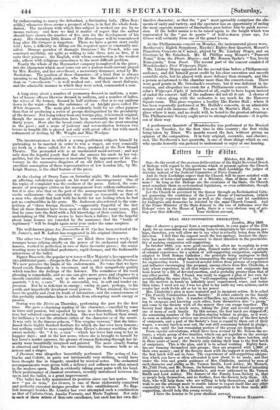The other two "foreign theatres" are filled three times a
week ; the younger house relying chiefly on the power of its orchestral and choral masses, worked to perfection in two or three favourite pieces ; the senior trusting more to individual performers, rapid changes, and the fashionable attractions of the ballet. •
Signor Baucaide, the popular new tenor at Her Majesty's, has appeared in two additional parts—Jacopo in the Due Foscari, and Arturo in the Puritani. We now perceive the limits of his endowments. No voice that we have heard excels Baucarde's in sweetness, and in that sympathetic quality which touches the feelings of the listener. The roundness of his vocal phrasing is remarkable, and no one can give more grace and elegance to a smooth cantabile strain, such as the solo passages in Bellini's beautiful quartett, "A te, o cars." He is successful, too, in soft and tender ex- pression. But he is deficient in energy ; owing in part, perhaps, to his youth and imperfectly developed vocal powers. When strained, his voice loses its quality and even its truth of intonation • and the consciousness of this probably admonishes him to refrain from attempting much energy or passion. Sontag was the Elvira on Thursday, performing the part for the first time. She gave a charming reading of the character,—excelled by some in force and passion, but equalled by none in refinement, delicacy, and true but subdued expression of feeling. She was less brilliant than usual, for brilliancy is not the attribute either of the character or of the music. It was only in the famous polacca, " Son vergine vezzosa," that she intro- duced those highly finished fioriture for which she has ever been famous ; but nothing could be more exquisite than Elvira's dreamy warbling of the sweet melody—the " A te, o cara"—which her lover had sung to her in happier days ; and in the last scene, where she is brought to herself by her lover's tender caresses, the gleams of reason flickering through her in- sanity were beautifully imagined and painted. The more closely Sontag is observed and listened to, the more charming she becomes both as an actress and a singer. I Pbritani was altogether beautifully performed. The acting of La- blache and Coletti, in parts not intrinsically very striking, would have been thought fine in tragedy, unaided by musical notes. The orchestral accompaniments were given with a delicacy and softness too often missed in the modern opera. Balfe is evidently taking great pains with his band. Their performance of classical overtures, recently introduced between the opera and the ballet, is a great improvement. The ballet has fully maintained its position since our last notice. The new "pas de trois," Lee Graces, is one of those elaborately conceived and perfectly executed designs peculiar to this establishment. No Eng- lish manager besides Mr. Lumley has ever attempted such a combination as that of Carlotta Grist, Amelia Ferraris, and Marie Taglioni. Not only As each of these artists of first-rate excellence, but each has her own dis- tinctive character ; so that the " pas" most agreeably comprises the ele- ments of unity and variety, and the spectator has an opportunity of seeing the most opposite manners of fascination pass before Min in quick succes- sion. If the ballet mania is to be raised again to the height which was represented by the "pas de quatre " of half-a-dozen years ago, Les Graces will certainly form one of the grand levers.


























 Previous page
Previous page